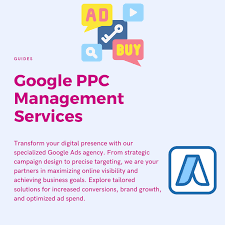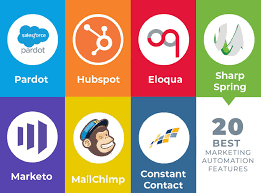The Power of Google PPC Management
Pay-Per-Click (PPC) advertising is a powerful tool for businesses looking to increase their online visibility and drive targeted traffic to their websites. Among the various platforms available for PPC advertising, Google Ads stands out as one of the most popular and effective choices.
Google PPC management involves the strategic planning and execution of pay-per-click campaigns on Google Ads to achieve specific marketing objectives. It requires a deep understanding of keywords, audience targeting, ad copywriting, bid management, and performance tracking.
Benefits of Google PPC Management:
- Targeted Reach: With Google Ads, businesses can target specific keywords and demographics to reach their ideal audience.
- Immediate Results: PPC campaigns can generate instant traffic and results, making it an ideal choice for businesses looking for quick wins.
- Cost-Effective: Google Ads allows businesses to set budgets and bids based on their financial capabilities, ensuring cost-effective advertising.
- Data-Driven Insights: Through detailed analytics and reporting tools, businesses can gain valuable insights into the performance of their PPC campaigns and make data-driven decisions.
- Scalability: Google PPC campaigns can be easily scaled up or down based on performance metrics and business goals.
Key Components of Google PPC Management:
A successful Google PPC management strategy involves several key components:
- Keyword Research: Identifying relevant keywords that align with business goals and target audience search queries.
- Campaign Structure: Organising campaigns into ad groups with specific themes to improve relevance and ad quality.
- Bid Management: Monitoring bids to ensure optimal ad placement while maximising return on investment (ROI).
- Ad Copy Optimisation: Crafting compelling ad copy that resonates with the target audience and encourages clicks.
- Landing Page Optimisation: Creating landing pages that are aligned with ad messaging to improve conversion rates.
In conclusion, effective Google PPC management is essential for businesses looking to leverage the power of pay-per-click advertising on one of the largest search engine platforms. By implementing a well-planned strategy that focuses on targeting the right audience, optimising ad performance, and tracking key metrics, businesses can achieve significant success in driving traffic and conversions through Google Ads.
A Step-by-Step Guide to Running a PPC Campaign on Google
Exploring Google’s Adoption of PPC Advertising
4. Deciphering the Acronym: What Does PPC
- What is Google Ads PPC management?
- How do I run a PPC on Google?
- Does Google use PPC?
- What does PPC stand for Google?
- What is the PPC management process?
- Is Google Ads PPC or CPC?
- What is Google’s PPC system called?
What is Google Ads PPC management?
Google Ads PPC management refers to the strategic process of overseeing and optimising pay-per-click advertising campaigns within the Google Ads platform. It involves tasks such as keyword research, ad creation, bid management, budget allocation, performance tracking, and continuous refinement to ensure that the ads are reaching the right audience and generating desired results. Effective Google Ads PPC management aims to maximise return on investment (ROI) by targeting relevant keywords, improving ad quality and relevance, and ultimately driving traffic and conversions for businesses. It requires expertise in digital marketing and a deep understanding of Google Ads’ functionalities to create successful campaigns that align with business objectives.
How do I run a PPC on Google?
To run a PPC campaign on Google, start by creating a Google Ads account and setting up your campaign. Begin by defining your campaign goals, selecting relevant keywords, writing compelling ad copy, and setting a budget. Target specific locations, demographics, and devices to reach your desired audience effectively. Monitor your campaign’s performance regularly and adjust your bids and targeting as needed to maximise results. Utilise Google Ads’ analytics tools to track key metrics such as click-through rates and conversions to measure the success of your PPC campaign on Google.
Does Google use PPC?
Yes, Google does use PPC (Pay-Per-Click) as part of its advertising services through Google Ads. Google Ads is a powerful platform that allows businesses to create and run PPC campaigns to target specific keywords and audiences across the Google Search Network, Display Network, and other partner websites. By bidding on keywords relevant to their products or services, businesses can display their ads to users who are actively searching for related information. This pay-per-click model ensures that advertisers only pay when their ads are clicked on, making it a cost-effective and measurable advertising solution.
What does PPC stand for Google?
PPC stands for Pay-Per-Click in the context of Google Ads. It is a form of online advertising where advertisers pay a fee each time their ad is clicked on. Google PPC management involves creating and managing pay-per-click campaigns on Google Ads to drive targeted traffic to websites and increase online visibility. By strategically selecting keywords, setting bids, and crafting compelling ad copy, businesses can effectively reach their target audience and achieve their marketing objectives through Google PPC advertising.
What is the PPC management process?
The PPC management process refers to the systematic approach taken to plan, execute, and optimise pay-per-click advertising campaigns effectively. It typically involves several key steps, starting with thorough keyword research to identify relevant search terms that align with the business goals. Next, the campaign structure is established, grouping keywords into ad sets with specific themes for better targeting and relevance. Bid management is crucial in adjusting bids to achieve optimal ad placement while maximising return on investment. Ad copy optimisation focuses on crafting compelling and engaging ad content that resonates with the target audience. Lastly, continuous monitoring and analysis of campaign performance allow for data-driven decisions to improve results over time. By following a structured PPC management process, businesses can enhance their online visibility, drive targeted traffic, and ultimately achieve their marketing objectives efficiently.
Is Google Ads PPC or CPC?
One frequently asked question in the realm of Google PPC management is whether Google Ads operates on a PPC (Pay-Per-Click) or CPC (Cost-Per-Click) model. The answer to this query is that Google Ads utilises both PPC and CPC models. In essence, advertisers pay for their ads based on the number of clicks they receive (PPC), with the cost per click (CPC) determined by factors such as keyword competitiveness and bid amount. This dual approach allows advertisers to control their spending while targeting specific audiences effectively, making Google Ads a versatile and efficient platform for online advertising campaigns.
What is Google’s PPC system called?
Google’s PPC system is called Google Ads, formerly known as Google AdWords. It is a powerful online advertising platform that allows businesses to create and run pay-per-click campaigns to reach their target audience effectively. With Google Ads, businesses can bid on keywords related to their products or services and display ads on Google’s search engine results pages and partner websites. This system provides businesses with a flexible and measurable way to promote their offerings and drive relevant traffic to their websites.




